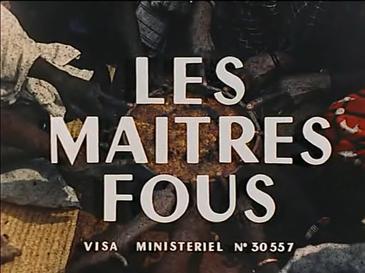Note : This review is my
contribution to the Shorts!
blogathon hosted by Movies
Silently from May 2nd to the 4th of 2015. Please visit the links and enjoy the
readings of the other great writers participating.
Les maîtres fous (The
Mad Masters) (Jean Rouch, 1955)
The
effects of colonialism are exposed in this film on indigenous Africans via
specific rituals developed as a reaction to the colonial system. The film turns
into a crazy elaboration on both the madness of such a political system and man
himself.
Banned in
Niger and British territories like Ghana, Jean Rouch’s Les maîtres fous is a docufiction about ethnology and colonialism.
Rouch was himself a well known ethnologist and developed the genre
ethnofiction. At the time when Rouch directed and presented his film nations
were about to get free from their masters. Movements of nationalism and
liberation were budding all over the world. In 1958, Niger for example gained
its Independence.
Les maîtres fous presents the sect of the Haukas that
initiates its participants with possessions and representations of the behaviors
of their masters. In a way they try to emulate the actions of their oppressors
and simulate and expiate their sufferings. As they do this afterwards the
Haukas are shown working with big smiles and happiness despite the poor
condition of hard work.
Another
explanation of this tradition is an African interpretation of the rituals as it
is a way to take their rivals power and eat it. For non-African people this
interpretation seems difficult to understand but many rituals executed in
Africa are old of hundreds, if not, thousands of years and are anchored deep
into the collective mind of these people.
Jean Rouch
with his docufiction seems to be exploiting a sensationalist behavior that
gives a racist vision of colonialism. Well, let’s face it, colonialism was the
act of Imperialist nations wanting to spread their culture and conquer the
world with ideas, language, religion. It was also a way to get resources at
almost no price with cheap labor. Sure racism has many masks but colonialism
was one of them. Discarding the locals’ culture and imposing your own can’t be
good for your politics and men.
But Rouch
wants to show the reaction of the locals after many years of colonialism in their
home land. No surprise the film was banned; it depicted without any filter the
direct effects of nations on the verge of their independence living under the
leaders of imperialist nations and making benefits on the hard work and land of
their locals.
As a film of
36 minutes, Les maîtres fous was less
disturbing that I thought it would be. It is straight to the point and narrated
by Rouch himself. What’s interesting with documentaries, in this case a sixty
years old one, is that it is a document depicting a slice of history very
specific to a part of the world where few documents are available since history
was more an oral tradition than our academic interpretation of the discipline.
It is important that such short films and documentaries are preserved for
generations to come to understand the past and the variety of ethnicity.




This sounds like an important and fascinating film. I've bookmarked it on YouTube. Thanks!
ReplyDeleteIt is indeed an important piece of testimony of history. I will be curious to know your impressions after watching it.
DeleteThanks so much for joining in with this intriguing film. Powerful things do indeed come in small packages.
ReplyDeleteThank you for hosting another great blogathon! It was a pleasure!
DeleteThank you for pointing us to this one. I have to learn more about Jean Rouch.
ReplyDeleteI also have to watch so many of his documentaries and I'm glad I brought this to you!
Delete